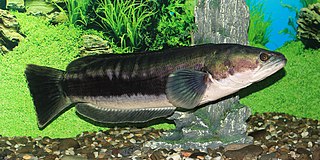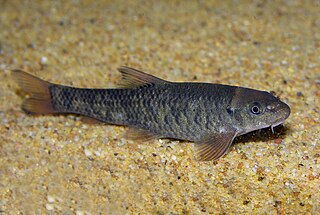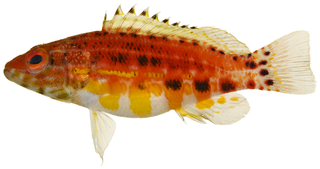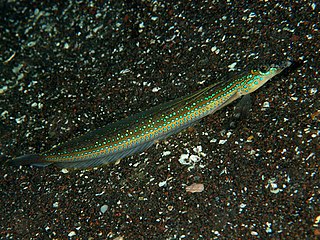
Channa is a genus of predatory fish in the family Channidae, commonly known as snakeheads, native to freshwater habitats in Asia. This genus contains about 50 scientifically described species. The genus has a wide natural distribution extending from Iraq in the west, to Indonesia and China in the east, and parts of Siberia in the Far East. A particularly high richness of species exists in Myanmar (Burma) and northeastern India, and many Channa species live nowhere else. In contrast, a few widespread species have been introduced to several regions outside their natural range, where they often become invasive. The large and medium-sized Channa species are among the most common staple food fish in several Asian countries, and they are extensively cultured. Apart from their importance as a food fish, snakeheads are consumed in some regions as a traditional medicine for wound healing and reducing postoperative pain and discomfort, and collected for the international aquarium pet trade.

Citharichthys is a genus of flatfish in the large-tooth flounder family, Paralichthyidae. They have both eyes on the left sides of their heads. They are native to the oceans around the Americas, with a single species, C. stampflii off the West African coast. Most are found in relatively shallow depths, but the genus also includes species found in deep water and species that enter fresh water.

Ophichthidae is a family of fish in the order Anguilliformes, commonly known as the snake eels. The term "Ophichthidae" comes from Greek ophis ("serpent") and ichthys ("fish"). Snake eels are also burrowing eels. They are named for their physical appearance, as they have long, cylindrical, snake-like bodies. This family is found worldwide in tropical to warm temperate waters. They inhabit a wide range of habitats, from coastal shallows and even rivers, to depths below 800 m (2,600 ft). Most species are bottom dwellers, hiding in mud or sand to capture their prey of crustaceans and small fish, but some are pelagic.

Coelorinchus is a genus of rattail fish.

Hymenocephalus is a genus of rattails.

Ventrifossa is a genus of rattails in the family Macrouridae.

Enneanectes is a genus of triplefin fish in the family Tripterygiidae.

The Platycephalidae are a family of marine ray-finned fish, most commonly referred to as flatheads. They are relatives of the lionfish, and belong to the order Perciformes.

Garra is a genus of fish in the family Cyprinidae. These fish are one example of the "log suckers", sucker-mouthed barbs and other cyprinids commonly kept in aquaria to keep down algae. The doctor fish of Anatolia and the Middle East belongs in this genus. The majority of the more than 160 species of garras are native to Asia, but about one-fifth of the species are from Africa.

Sillago is a genus of fish in the family Sillaginidae and the only non-monotypic genus in the family. Distinguishing the species can be difficult, with many similar in appearance and colour, forcing the use of swim bladder morphology as a definitive feature. All species are benthic in nature and generally coastal fish, living in shallow, protected waters although there are exceptions. Minor fisheries exist around various species of Sillago, making them of minor importance in most of their range. This genus has the widest distribution of any smelt-whiting genus, spanning much of the Indo-Pacific. The genus ranges from the east coast of Africa to Japan in the east and Southern Australia in the south, with most species concentrated around South East Asia, the Indonesian Archipelago and Australia. Many species have overlapping distribution, often making positive identification hard.

Serranus is a genus of fish in the family Serranidae. It is one of five genera known commonly as the "Atlantic dwarf sea basses". These fish are hermaphrodites, each individual possessing functional male and female reproductive tissues. When a pair spawns, one fish acts as a male and the other acts as a female.

Trichonotus is a genus of marine gobiiform fishes. Species of Trichonotus are distributed throughout the Indo-West Pacific. This genus is the only member of the family Trichonotidae.

The spotted sand-diver is a perciform fish in the family Trichonotidae. T. setiger is the type species of genus Trichonotus.

Loaches are ray-finned fish of the suborder Cobitoidei. They are freshwater, benthic (bottom-dwelling) fish found in rivers and creeks throughout Eurasia and northern Africa. Loaches are among the most diverse groups of fish; the 1249 known species of Cobitoidei comprise about 107 genera divided among 9 families.

Starksia is a genus of labrisomid blennies native to the western Atlantic Ocean and the eastern Pacific Ocean. Their typical length is 2 cm (0.79 in) SL. The generic name honours the American ichthyologist Edwin Chapin Starks (1867-1932) of Stanford University for his work on Pacific coastal fishes. As a genus Starksia is distinguished from other labrisomids by their scaled bodies, two obvious soft rays in the pelvic fin and the male's have an intromittent organ which is near to or attached to the first spine of their anal fins, which is also somewhat separated from the fin.
Joseph (Joe) Schieser Nelson was a Canadian ichthyologist. He is best known for the book Fishes of the World, which is the standard reference in fish systematics and evolution.

Limnichthys is a genus of sandburrowers native to the Indian and Pacific oceans.

Pomadasys is a genus of grunts native to the waters of the eastern Atlantic Ocean and through the Indian Ocean to the Pacific coast of the Americas. The name of this genus is a compound of poma meaning "lid" or "covering" and dasys meaning "rough", a reference to the serrated preopercle.

Pristolepis is a genus of fish in the family Pristolepididae sometimes classified in the order Anabantiformes native to freshwater habitats in Southeast Asia and India's Western Ghats. This genus is the only member of its family, a family which, with the families Nandidae and Polycentridae is a group of taxa which are sisters to the Anabantiformes and form part of an unnamed and unranked clade within the series Ovalentaria, closest to the Carangiformes. These three families share the common name "leaffish".

Synbranchinae is a subfamily of swamp eel, consisting of six of the ten genera in the family Synbranchidae. The remaining genus, the monotypic Macrotrema is the only one in the other subfamily Macrotreminae. The subfamily occurs in the Neotropics, Afrotropics and Asia.



















